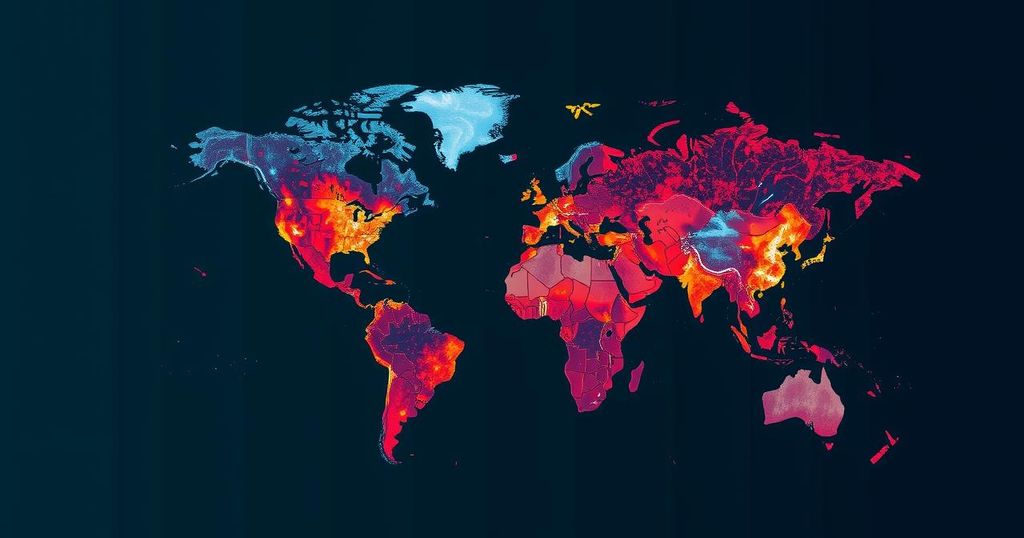The UNFCCC faces a $61.53 million funding gap for 2024, threatening global climate negotiations as the world could see temperatures rise by over 3 degrees Celsius. Key contributors, the United States and China, have yet to meet their financial obligations. The shortfall has led to reductions in UNFCCC activities and jeopardizes future climate financing, necessitating immediate action to curb emissions to avoid catastrophic temperature increases. The upcoming COP29 summit is critical for advancing commitments to reduce greenhouse gas emissions.
A significant funding deficit is jeopardizing the future of international climate negotiations, particularly as the world faces the alarming prospect of temperatures rising by over 3 degrees Celsius by the end of the century. The United Nations Framework Convention on Climate Change (UNFCCC), which is the principal body coordinating climate discussions among nearly 200 countries, has reported a shortfall of at least $61.53 million for its budget in 2024. This figure constitutes nearly half of the funding required to facilitate global efforts aimed at diminishing climate-warming emissions and organizing summits focused on accountability among nations. This funding gap exists despite previous agreements by member nations on the budget and their expected contributions. The budget comprises a core fund to which countries are obligated to contribute, along with a supplementary fund that relies on voluntary donations, and an additional fund to support diplomats from less affluent countries in attending negotiations. Alarmingly, the two nations yet to fulfill their financial commitments to the UNFCCC are the United States and China, which are both the largest global economies and the principal emitters of greenhouse gases. As of October, the United States was responsible for a $7.9 million deficit in the core budget, despite having contributed $2.7 million to support supplementary efforts. Similarly, China owed $6.1 million to the core budget, in addition to a partial contribution of $538,000 towards the supplementary fund. Although officials from both nations have assured that payments will be made within the year, precise timelines for these contributions remain unspecified. Due to the funding shortfalls, the UNFCCC has had to scale back its operations, resulting in reduced working hours at its headquarters in Bonn and the cancellation of regional climate events this year. These events previously attracted considerable investments in renewable energy and climate-focused initiatives. The shortfall also jeopardizes the integrity of UN climate negotiations concerning trillions of dollars in climate financing. Currently, there is a $2.2 million gap affecting funding for diplomats to attend critical climate discussions, including the upcoming COP29 summit in Baku, Azerbaijan. Even if both the United States and China meet their commitments this year, it would still not be sufficient to address the overall budgetary shortfall, which is described as the most significant in UNFCCC history. The urgency of these financial issues coincides with a new United Nations report warning that the world may experience a 3.1 degrees Celsius increase in temperature by 2100 if immediate action is not taken to curb emissions. The UN’s Emissions Gap Report 2024 stresses that nations must initiate drastic reductions in emissions without delay if they wish to maintain the global target of limiting the temperature rise to below 1.5 degrees Celsius — a goal now seen as increasingly unattainable. According to UN Secretary-General Antonio Guterres, “We’re teetering on a planetary tightrope. Either leaders bridge the emissions gap, or we plunge headlong into climate disaster.” In light of the ongoing funding struggles and the critical climate data underscoring the pressing need for action, the COP29 summit in Baku presents a crucial opportunity for countries to advance their strategies for emission reductions. The urgency to act is reiterated by Inger Andersen, Executive Director of the United Nations Environment Programme, urging nations to maximize the impact of the Baku discussions: “Every fraction of a degree avoided counts in terms of lives saved, economies protected, damages avoided, biodiversity conserved and the ability to rapidly bring down any temperature overshoot.”
The global climate negotiations, led by the UN Framework Convention on Climate Change (UNFCCC), are fundamental to addressing the pressing issues of climate change amidst escalating global temperatures. With nearly 200 countries involved, securing adequate funding is essential to facilitate these discussions and commitments effectively. Recent reports highlight a significant funding gap that threatens the coordination of international efforts to mitigate climate impacts, enhancing the urgency for nations to fulfill their financial obligations. The UN’s 2024 Emissions Gap Report further outlines the dire consequences of inaction, emphasizing the crucial need for immediate and coordinated global responses to climate change.
The current funding deficiencies faced by the UNFCCC represent a serious hindrance to international climate negotiations at a time when pressing global temperature increases are imminent. Despite existing commitments by major economies like the United States and China, pervasive delays in fulfilling financial obligations risk undermining efforts to curb emissions. As emphasized by UN officials, immediate action is imperative to avert catastrophic climate consequences, underlining the critical nature of the forthcoming COP29 summit as a platform for advancing effective emission reduction strategies.
Original Source: www.asiafinancial.com






